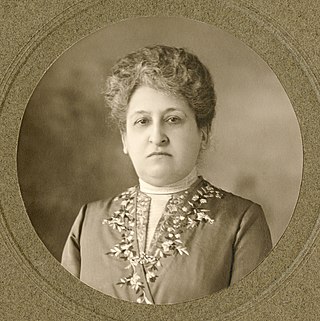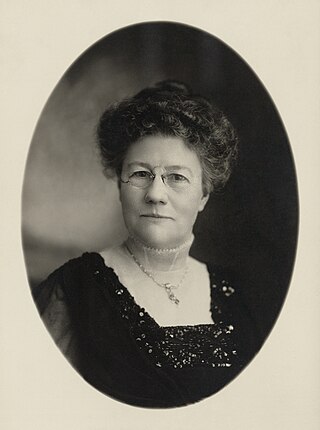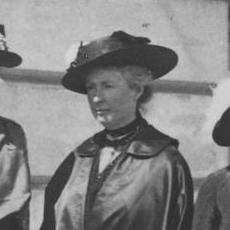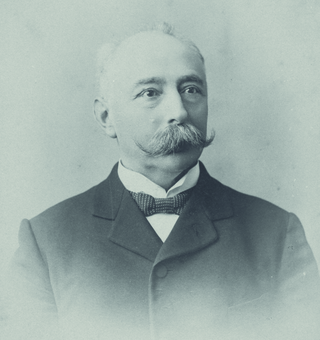Related Research Articles
The history of feminism comprises the narratives of the movements and ideologies which have aimed at equal rights for women. While feminists around the world have differed in causes, goals, and intentions depending on time, culture, and country, most Western feminist historians assert that all movements that work to obtain women's rights should be considered feminist movements, even when they did not apply the term to themselves. Some other historians limit the term "feminist" to the modern feminist movement and its progeny, and use the label "protofeminist" to describe earlier movements.
First-wave feminism was a period of feminist activity and thought that occurred during the 19th and early 20th century throughout the Western world. It focused on legal issues, primarily on securing women's right to vote. The term is often used synonymously with the kind of feminism espoused by the liberal women's rights movement with roots in the first wave, with organizations such as the International Alliance of Women and its affiliates. This feminist movement still focuses on equality from a mainly legal perspective.

Rosika Schwimmer was a Hungarian-born pacifist, feminist, world federalist, and women's suffragist. A co-founder of the Campaign for World Government with Lola Maverick Lloyd, her radical vision of world peace led to the creation of several world federalist movements and organizations. Sixty years after she first envisaged it, the movement she helped to create indeed took a leading role in the creation of the International Criminal Court, the first permanent international tribunal tasked with charging individuals with war crimes, crimes against humanity and genocide.

The University of Michigan Library is the academic library system of the University of Michigan. The university's 38 constituent and affiliated libraries together make it the second largest research library by number of volumes in the United States.

The Arthur and Elizabeth Schlesinger Library on the History of Women in America is a research library at the Radcliffe Institute for Advanced Study, Harvard University. According to Nancy F. Cott, the Carl and Lily Pforzheimer Foundation Director, it is "the largest and most significant repository of documents covering women's lives and activities in the United States".

Aletta Henriëtte Jacobs was a Dutch physician and women's suffrage activist. As the first woman officially to attend a Dutch university, she became one of the first female physicians in the Netherlands. In 1882, she founded the world's first birth control clinic and was a leader in both the Dutch and international women's movements. She led campaigns aimed at deregulating prostitution, improving women's working conditions, promoting peace and calling for women's right to vote.
The academic discipline of women's writing is a discrete area of literary studies which is based on the notion that the experience of women, historically, has been shaped by their sex, and so women writers by definition are a group worthy of separate study: "Their texts emerge from and intervene in conditions usually very different from those which produced most writing by men." It is not a question of the subject matter or political stance of a particular author, but of her sex, i.e. her position as a woman within the literary world.

The John Crerar Library is a research library, which after a long history of independent operations, is now operated by the University of Chicago. Throughout its history, the library's technology resources have made it popular with Chicago-area business and industry. Though privately owned and operated, the library continues to provide free access to the public for the purpose of conducting research in science, medicine and technology.

Ida Husted Harper was an American author, journalist, columnist, and suffragist, as well as the author of a three-volume biography of suffrage leader Susan B. Anthony at Anthony's request. Harper also co-edited and collaborated with Anthony on volume four (1902) of the six-volume History of Woman Suffrage and completed the project by solo writing volumes five and six (1922) after Anthony's death. In addition, Harper served as secretary of the Indiana chapter of the National Woman Suffrage Association, became a prominent figure in the women's suffrage movement in the U.S., and wrote columns on women's issues for numerous newspapers across the United States. Harper traveled extensively, delivered lectures in support of women's rights, handled press relations for a women's suffrage amendment in California, headed the National American Woman Suffrage Association's national press bureau in New York City and the editorial correspondence department of the Leslie Bureau of Suffrage Education in Washington, D.C., and chaired the press committee of the International Council of Women.
Feminism in the Netherlands began as part of the first-wave feminism movement during the 19th century. Later, the struggles of second-wave feminism in the Netherlands mirrored developments in the women's rights movement in other Western countries. Women in the Netherlands still have an open discussion about how to improve remaining imbalances and injustices they face as women.

Atria, institute on gender equality and women's history is a public library and research institute in Amsterdam dedicated to research and policy advice on gender equality and to the documentation and archival of women's history. Its previous names were International Information Centre and Archive for the Women's Movement (IIAV) (1988-2009) and Aletta, Institute for Women's History (2009-2013).
International Archives for the Women's Movement was founded in Amsterdam in 1935, as a repository to collect and preserve the cultural heritage of women and make the documents of the movement available for study. The entire collection was stolen by the Nazis in 1940 and only small portions were recovered after the war. In 1988, the part of the archival collection which had not been looted by the Nazis became the foundational collection of the International Information Centre and Archives for the Women's Movement. A substantial portion of the archive was discovered in Moscow in 1992 and returned to Amsterdam in 2003. In 2013, the institution which houses the collection was renamed as the Atria Institute on Gender Equality and Women's History

The Hungarian Feminist Association was created by Rosika Schwimmer and Vilma Glücklich. The organization pushed for women's equality in Hungary in all spheres of women's life. In addition to pressing for women's suffrage, they drafted replies to modification of the marriage statutes and urged government response to address employment and training for women workers.

Cornelia Ramondt-Hirschmann was a Dutch teacher, feminist, pacifist and theosophist active in the first half of the twentieth century. She was one of the women who participated in the push by pacifist feminists during World War I for world leaders to develop a mediating body to work for peace. The culmination of their efforts would be the achievement of the League of Nations when the war ended. Between 1935 and 1937, she served as one of the three international co-chairs of the Women's International League for Peace and Freedom (WILPF).
The Kenneth Spencer Research Library is a library at the University of Kansas (KU) in Lawrence. Completed and dedicated in 1968, the library houses special collections materials including rare books, maps, archives, and photographs. The library is open to members of the public and is not limited to students and faculty members at KU.

Mien van Wulfften Palthe was a Dutch feminist and pacifist. As a member of the Vereeniging voor Vrouwenkiesrecht and Women's International League for Peace and Freedom, she strove to secure enfranchisement for women and worked as an advocate peace.

Carel Victor Gerritsen was a Dutch politician known for his radical views. The husband of Aletta Jacobs, he was a proponent of open government, fair wages and birth control. He served as an alderman in Amsterdam and a representative in the States of North Holland. He helped found many radical organisations in the Netherlands including the Nieuw-Malthusiaansche Bond, Radicale Bond and Vrijzinnig-Democratisch Bond.

Bertha "Betsy" Bakker-Nort was a Dutch lawyer and politician who served as a member of the House of Representatives for the Free-thinking Democratic League (VDB) from 1922 to 1942.
World Center for Women's Archives was an organization established by Rosika Schwimmer and Mary Ritter Beard in the hopes of creating an educational collection which women could consult to learn about the history of women. The center was located in the Biltmore Hotel at 41 Park Avenue in New York City. It closed in 1940, but the efforts made to establish a center to collect records encouraged several colleges and universities to begin develop similar archives of women's history. It was one of the earliest efforts to collect women's documents in the United States, predated the first accredited women's studies course in the U.S by 34 years, and preserved materials about women which otherwise might have been lost. It also redefined the way that historical documents were selected for archival inclusion. By changing what documents were noteworthy, using personal records to shape public history, the Women's Archive legacy was foundational to the development of feminist theory.
Ariadne is an information and documentation center on women/gender hosted by the Austrian National Library in Vienna. Ariadne was founded by Christa Bittermann-Wille and Helga Hofmann-Weinberger in 1992 with the aim of facilitating study on gender and women. It provides a digital interface for locating information by and about women. The center is located at Josefsplatz 1, A-1015 in Vienna, which is the address of the Austrian National Library, and does not offer a separate facility for women's research.
References
Citations
- 1 2 3 Sharistanian et al. 1976, p. 200.
- 1 2 Linkugel 1977, p. 216.
- ↑ Jacobs 1996, p. 118.
- ↑ Relph 1979, p. 602.
- ↑ Voss-Hubbard 1995, p. 17.
- 1 2 Golderman & Connolly 2013, p. 110.
- 1 2 Sharistanian et al. 1976, p. 201.
- ↑ Sharistanian et al. 1976, p. 205.
- ↑ Golderman & Connolly 2013, p. 111.
- 1 2 Sharistanian et al. 1976, p. 202.
- ↑ Sharistanian et al. 1976, pp. 203–204.
- ↑ Sharistanian et al. 1976, p. 203.
- ↑ Sharistanian et al. 1976, p. 204.
- ↑ Miller & Pellen 2006, p. 107.
Bibliography
- Golderman, Gail; Connolly, Bruce (January 2013). "Ereviews:Feminism—The Gerritsen Collection of Aletta H. Jacobs". Library Journal . New York City, New York: Media Source Inc. 138 (1): 110–111. ISSN 0363-0277. – via EBSCO Host (subscription required)
- Jacobs, Aletta (1996). Feinberg, Harriet; Wright, Annie (eds.). Memories: My Life as an International Leader in Health, Suffrage, and Peace (English ed.). New York, New York: Feminist Press. ISBN 978-1-558-61138-2.
- Linkugel, Wil A. (April 1977). "The Gerritsen Collection". Quarterly Journal of Speech . Columbia, Missouri: National Association of Teachers of Speech. 63 (2): 216–217. ISSN 0033-5630. – via EBSCO Host (subscription required)
- Miller, William; Pellen, Rita M., eds. (2006). Evolving Internet Reference Resources. Binghamton, New York: Haworth Information Press. ISBN 978-0-7890-3025-2.
- Relph, Anne Kimbell (Spring 1979). "The World Center for Women's Archives, 1935–1940". Signs . Chicago, Illinois: University of Chicago Press. 4 (3): 597–603. doi:10.1086/493651. ISSN 0097-9740. JSTOR 3173414. S2CID 144378618.
- Sharistanian, Janet; Arnold, Margaret; Cohn, Barbara; Harkess, Shirley; Parker, Linda; Shaw, Michael; Soutar, Joan; Worth, Carol (Spring–Summer 1976). "The (Dr. Aletta H. Jacobs) Gerritsen Collection the University of Kansas". Feminist Studies . 3 (3/4): 200–206. doi:10.2307/3177737. ISSN 0046-3663. JSTOR 3177737.
- Voss-Hubbard, Anke (Winter 1995). "'No Document—No History': Mary Ritter Beard and the Early History of Women's Archives". The American Archivist . Chicago, Illinois: Society of American Archivists. 58 (1): 16–30. doi: 10.17723/aarc.58.1.hr300127g3142157 . ISSN 0360-9081. JSTOR 40293886.